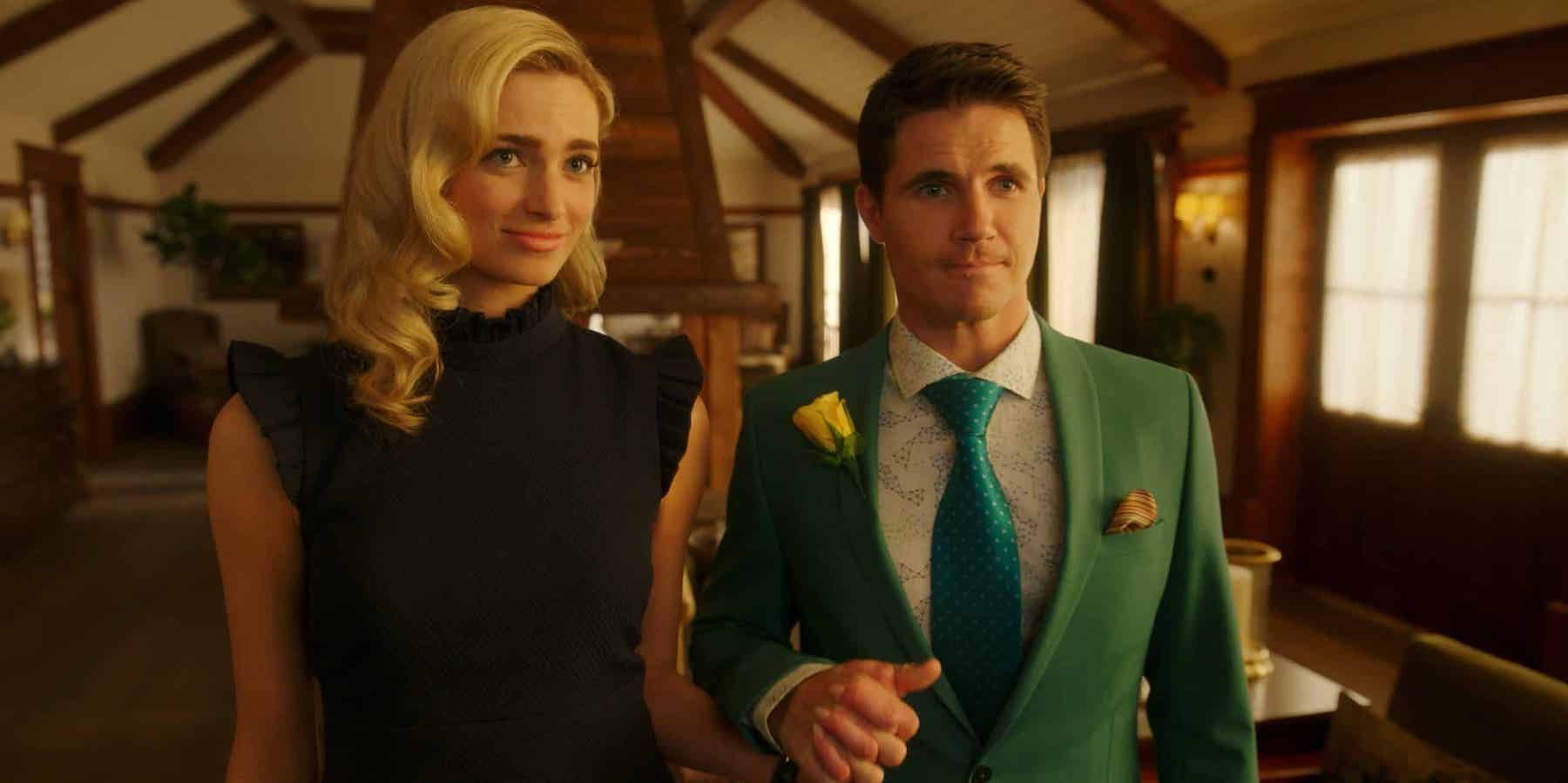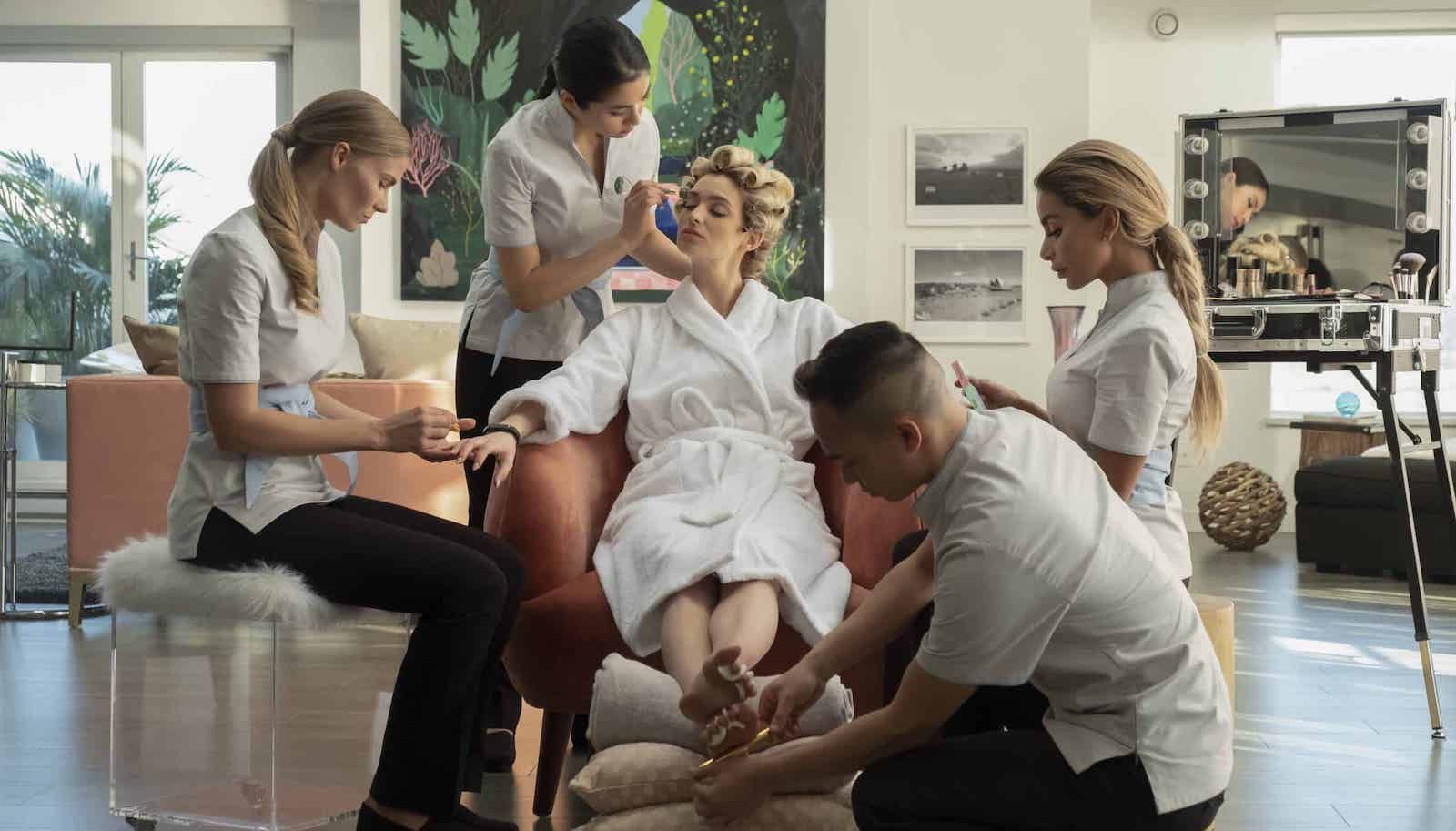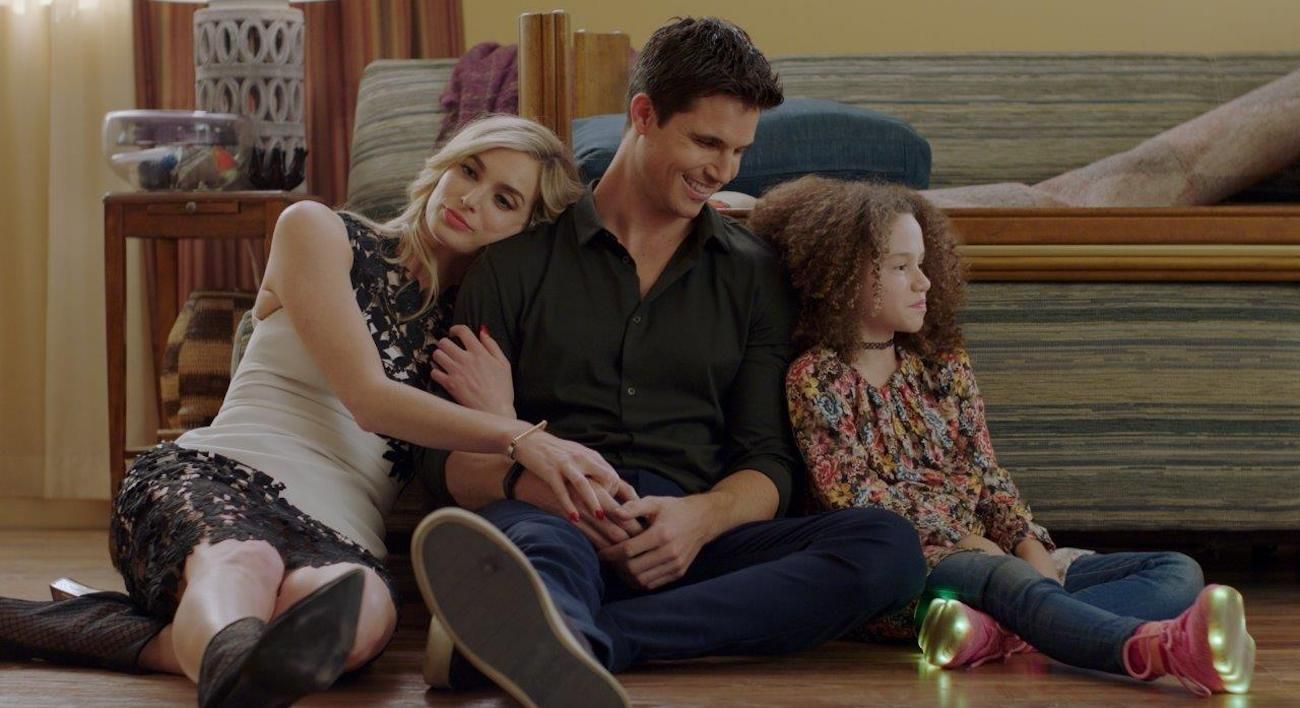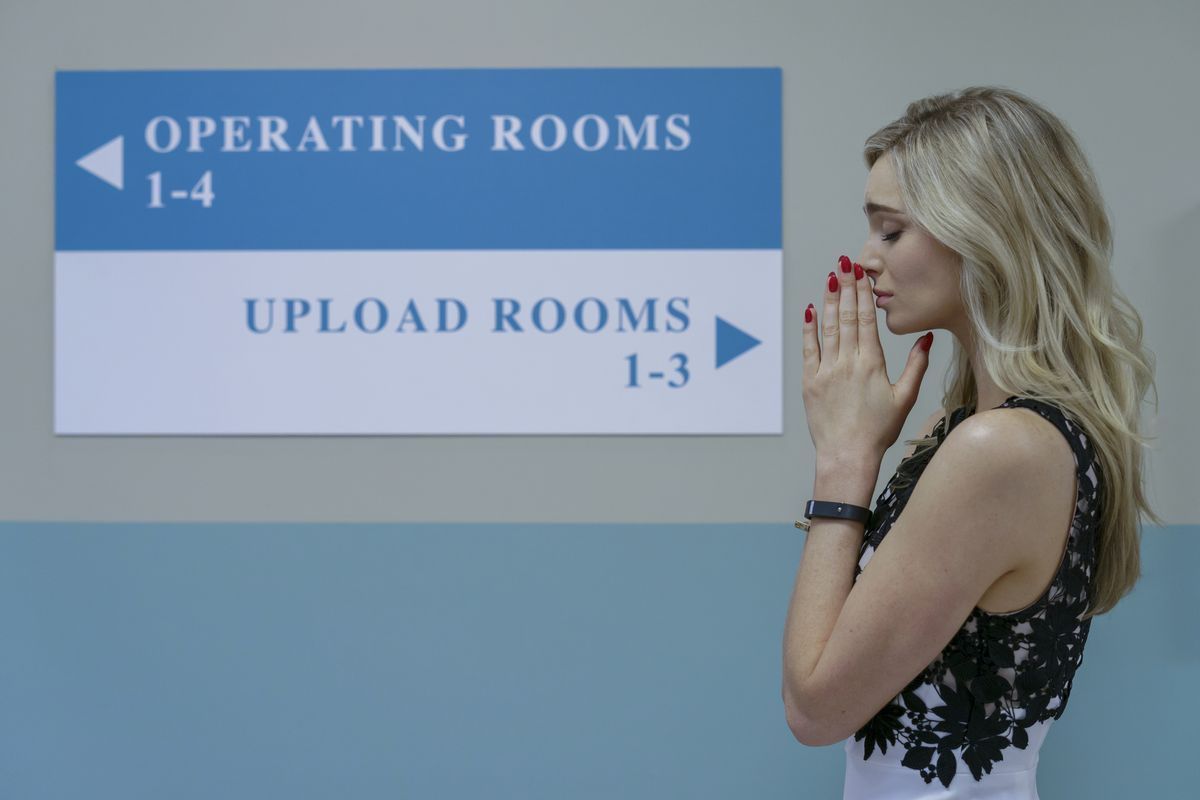On Amazon Prime's new sci-fi satire Upload, Allegra Edwards plays the beautiful and entitled Ingrid, the girlfriend of Robbie Amell's equally beautiful but far less wealthy Nathan. When Nathan meets an untimely demise and has his consciousness uploaded to a posh virtual afterlife, Ingrid is the one left holding the purse strings. That means Ingrid remains an important part of Nathan's post-life for better and worse. Edwards, in her second major role this year after playing Cindy on USA's Briarpatch, makes Ingrid a vain snob -- often to hilarious effect -- before slowly adding unexpected nuance to the character.
In an exclusive interview, Edwards opened up to CBR about empathizing with Ingrid, working with The Office creator and Upload mastermind Greg Daniels and infusing comedy into the role of the hot girl.
CBR: How did you get involved in the show?
Allegra Edwards: …I actually received what's called a self-tape audition, where I record in my friend's apartment on an iPhone and edit it together in iMovie, and then submit the audition to my agent, who then sends it to the casting director. And the response I got was directly from Greg Daniels, the executive producer, who said he wanted to see the second scene another time, gave me a little bit of instruction via email about what he'd like to see differently.
And then, within a matter of a few days I got a call from my agent that I had booked the role. But I had not met a casting director, I had not met the director, I had not been into a room to meet with anyone. Normally for a role the size you would test. And it was straight from taping in my friend's apartment at 8 a.m. in New York City to like get on a plane 48 hours later to go to the table read and the first costume fitting. It was very dramatic and really exciting.
Ingrid is a really interesting character because you're not completely sure about her intentions and she's not really supposed to be liked. How do you bring a character to life who the audience isn't supposed to take the side of?
I think it's great knowing where she will eventually go and, me as Allegra, being a little bit comforted knowing what's coming around the corner for her [through] the duration of the season. But then also, I think part of it is just looking at her, I think we all -- hopefully we all don't all know someone like Ingrid -- but for those of us that do know someone like Ingrid, the best way to get along with anybody that may be difficult is to try and empathize with them.
And so when some people may call her controlling, I like to say that she has a very clear vision. Or if maybe she's selfish, I like to say that she knows what she wants. And there are qualities in her that I admire and focus on from an admiration standpoint rather than from the not-so-likable qualities, you know. Because she can throw a great party. That’s something I admire. [laughs]…
The show has a very unique tone. How did you tackle the balance of drama and wry comedy?
Yeah, super unique. And this is actually something that Greg addressed early on at one of the first table reads actually. He... had this analogy for, I think it was called -- I'm gonna butcher this -- but it's a type of McDonald's sandwich that they marketed in like the '80s.... And the way they marketed it was, we serve it as an open sandwich because we want to keep the hot ingredients hot and the cold ingredients cold. And it's going to be a more delicious sandwich if you keep the hot hot in the cold cold.
And the reason that he brought that up was, when it comes to the drama or the dramatic tension in the show, it's a trap to want to play it up, yuck it up or like, "Okay, we're in a comedy, everything has to be funny." But that does a disservice to the honesty and the authenticity and the truth of what's going on, because that's life. The drama’s drama and the funny is funny, and sometimes they're side by side within the same sentence, but that doesn't mean the hot’s not hot and the cold’s not cold.
What about adjusting to the tech of the world? Was that something you understood immediately, because it's so different than anything I've seen before, even in sci-fi.
That was definitely a learning curve because the first thing we had to figure out was, okay, when you have camera phones, for example, that basically lives in your wristband and then projects a little screen into the crook of your hand -- between your thumb and your finger -- does opening your palm answer the phone, or does closing it turn it off? Or how do you need to orient it so that it's clear? What's going on? It was tricky to navigate.
We would find out through each episode, "Oh, we should probably clarify what needs a password and what doesn't." And I think what ended up happening is we just made decisions, and then bless our incredible [special effects] department, they had to go in and, "Okay, what is she doing with her fingers? Let's see if we can match that...." So I thought a lot about the Marvel movies or like Minority Report, and how many CGI are screens that are put in after the fact. And it's incredible what these visual effects guys can do -- guys and gals, I should say -- because they're taking what they're given rather than getting to tell us like, "You know what, it's gonna be better if you do it this way." So it’s pretty impressive.
Was any of it practical, like the self-driving cars or any of that?
So they had built a couple pod cars. I think we called them egg cars. And we used those for a lot of the interiors, like the interior of the vehicle. But then for the shot where, for example, when I'm pulling up to the sex-suit shop and getting out of a car, that was me sitting on an apple box in the gutter on a street in downtown Vancouver. And they would say, "Okay, try one where you duck your head a little; okay, try one where you don't duck as much; now, I guess, lock your car." It was a lot of squatting in the street and trying to guess how high the vehicle would be. So it was a challenge but very fun.
I can imagine you have to have a pretty good imagination.
It’s an exercise in both imagination but also trust. Like if I had gone into it with an attitude of, "Oh my gosh, does anybody know what this is gonna turn out like," then, I think that permeates. And that attitude is also infectious. So to just go, "Sure, tell me what to do and I'm going to do it and I trust you to take care of it to make it look really great."
The show also presents some timely issues about class. How much did that factor into your discussions with Greg Daniels and your performance?
That was also one of the interesting things about Ingrid is that she is in a different socioeconomic status than Nathan, Robbie [Amell]'s character. And it could be argued that she's doing him a great service and, she would argue, that it's quite generous to essentially sponsor someone who wouldn't be able to afford this [upload] service for themselves. But it comes at a price, which is [Nathan's] own freedom. And it did open up really cool conversations about well, "What does the ideal afterlife look like if you don't have independence or control?"
And I think that is similar to other conversations that I would have with my friends and family about the freedoms that wealth may present, but also the constriction that it presents too and the corruption, potentially. So yeah, there were definitely some conversations about that, for sure. Probably more on the table read side of it than in the acting of it. Yeah, that is something that did draw me to the script initially, was just the fact that the pilot laid it out there, that this was an idea of a future that had everybody divided on socioeconomic lines.
It’s very interesting, especially what we're looking at right now with people losing their jobs because of the pandemic. It’s sort of strangely timely.
Yeah it is! I don’t know if you noticed but in like the first 30 seconds of the show people are wearing those masks over their faces on the city bus. And we shot that pilot in 2018, the very first episode. So it's really wild that, I'm like, "Okay, Greg, are you a soothsayer? Are you a sage? How did you know where we would be in the year 2020 when people are finally going to get to see this."
What was it like working with Greg Daniels?
You know, Greg is… he's so smart and he's so kind. And… he's quiet and he's reserved, but he also has this side of him that is delighted by new ideas and is really open to collaboration. I think one of the things that I admire so much about him and also the atmosphere that he created was, "Okay, I trust you, I trust the ensemble I've built. I want you guys to be a part of the process. I want you to come into the writers room and talk about how you see your character. And chat with our writers and give them a sense of what you've discovered, inhabiting the role."
…It was very collaborative, and I found as a performer what that raises is trust, obviously, in in your leader, but also it forces me, anyway -- I'll speak for myself -- to bring out the best. Because someone is saying to me, "Hey, I believe in you and I believe in your ideas." And given my personality, that makes me want to lean in a little bit more and express my ideas more. And that just means there’s more ingredients to play with.
Throughout your career, you've done a lot of comedy, but you've also played the hot girl a lot. What's your favorite kind of role to tackle?
[Laughs] You know, that’s so true. I have a phrase that I use, if you were to characterize each of the people that I've played so far, and had the joy of getting to play, it would be: she may look good from far away, but don't get too close. And that can be interpreted any number of ways, right? And I actually do have a lot of fun with that. I enjoy the opportunity to infuse comedy into hot-girl roles. That's something I really get into. I like taking people by surprise.
But I think the types of roles that I really enjoy are women like Ingrid and also like this character, Cindy, that I just got to play on a TV show, Briarpatch, that’s on USA... [who are] a little bit more complex. Their motivations aren't necessarily stereotypical or cut and dry. Sometimes they do things that frustrate you, but then the next minute they do something really sweet and kind and good. And that, to me, is an accurate reflection of just how we are as people….
You've been acting for a really long time now, too. What is it about doing the work that keeps you coming back?
That’s a great question. I think, well, using Upload as an example, I would say -- and I think a lot of actors would feel the same way -- the chance to walk in someone else's shoes, as cliche as that sounds. It flexes the empathy muscle. And I think just from like a world health scenario, the stronger your empathy muscle, the better it is for everybody, not just for you, but for everybody around you.
And when I get a new script with a new story and fresh ideas, or especially a role that I'm a little nervous to play -- because like for Ingrid, she's not supposed to be likable, for someone who loves getting a laugh or getting applause, …you know, I'm a people-pleaser, to know that I might be a character that makes someone go, "Ew, she’s nasty…" -- that scared me a little bit. But understanding how someone like that might think or operate as if, "No, I'm actually doing the best I can," it creates space for more empathy when I come across people like that in my everyday life.
Are there any other upcoming projects you can tease?
As of right now, [Upload] has been my big exciting one that I'm looking forward to.... And the other thing I'm working on is I’m co-writing an idea for a series, a sketch series, with my writing partner. And we're still in the developmental stage, so right now it's in the incubator phase. But it’s a project that we’re working on and we’re really excited about….
Last question: If you could upload your consciousness when you died, would you do it?
[Laughs] You know, given what I know now, on this show, I don't think I would. And the reason is because -- and this is a personal viewpoint, it's not necessarily something that's said outright in the show -- but I would say that we're humans, and to design an afterlife, it's meant to feel like heaven, it's just not going to be perfect. And there will be flaws. And I think it's that sort of Tuck Everlasting, Edward Cullen [from Twilight] if you could live forever would you want to? And I don't think Edward Cullen was very happy, you know. So I don't think I would choose to upload myself, I'd rather do it the old-fashioned way.
Created by Greg Daniels (The Office), Upload stars Robbie Amell, Andy Allo, Allegra Edwards, Zainab Johnson and Kevin Bigley. The series is currently streaming on Amazon Prime Video.




